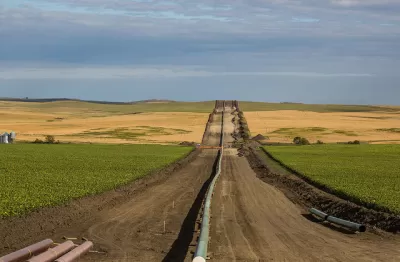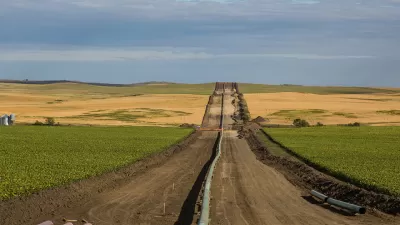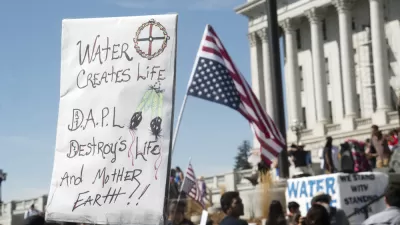The Army Corps of Engineers denied Energy Transfer Partners an easement for the Dakota Access Pipeline under Lake Oahe, advising them to explore alternative routing and conduct an environmental review, granting indigenous peoples a rare victory.

Jack Healy for The New York Times.
“It’s wonderful,” Dave Archambault II, the Standing Rock tribal chairman, told cheering supporters who stood in the melting snow on a mild North Dakota afternoon. “You all did that. Your presence has brought the attention of the world.”
The Army said it would look for alternative routes for the $3.7 billion Dakota Access pipeline.
“The best way to complete that work responsibly and expeditiously is to explore alternate routes for the pipeline crossing,” Jo-Ellen Darcy, the Army’s assistant secretary for civil works, said in a statement. The move could presage a lengthy environmental review that has the potential to block the pipeline’s construction for months or years.
In an article by the U.S. Army, "Darcy said that the consideration of alternative routes would be best accomplished through an Environmental Impact Statement with full public input and analysis." See Darcy's memo [PDF] on the decision.
"But it was unclear how durable the government’s decision would be," note Fandos and Healy.
President-elect Donald J. Trump, however, has taken a different view of the project and said as recently as last week that he supported finishing the 1,170-mile pipeline, which crosses four states and is almost complete.
Though the Army’s decision calls for an environmental study of alternative routes, the Trump administration could ultimately decide to allow the original, contested route. Representatives for Mr. Trump’s transition team did not immediately respond to requests for comment.
Furthermore, Kelcy Warren, chief executive of Energy Transfer Partners, "has said that the company was unwilling to reroute the pipeline, which is intended to transport as much as 550,000 barrels of oil a day from the oil fields of western North Dakota to a terminal in Illinois," add Fandos and Healy.
In a press release, Energy Transfer Partners, L.P. and Sunoco Logistics Partners L.P. called the Army Corps' decision a "purely political action."
This is nothing new from this Administration, since over the last four months the Administration has demonstrated by its action and inaction that it intended to delay a decision in this matter until President Obama is out of office.
In fact, the Army Corp's decision to deny the easement was foreshadowed when President Obama indicated last month that the Army Corps of Engineers was considering an alternative route for the project. In mid-November, Planetizen noted that the Corps indicated "that it needs more information before it can decide whether to allow the Dakota Access Pipeline to be built along its planned route."
Time to go home
For now, at least, Native Americans and their supporters could savor victory. Archambault "asked the thousands of 'water protectors' gathered in encampments along the Missouri river to 'go home'," reports Julia Carrie Wong for The Guardian. However, many refused to heed the directive, "fearing the pipeline victory was a 'trick'."
Though an administrative reversal would be subject to court review, according to the tribe’s lawyer, the pipeline company, Energy Transfer Partners, said in a statement on Monday that it intended to “complete construction of the pipeline without any additional rerouting”.
Routing of pipeline or the pipeline itself?
In an interview with National Public Radio's Michele Martin on Sunday, Archambault is asked his position on whether the protest was against the routing or if it had since expanded to a greater position against fossil fuels.
We have always maintained the same position. We never changed that position, and that was to protect what little we have left because of the encroachment of this infrastructure project on our lands. We never did say we didn't want this pipeline to happen at all. We said you are crossing our treaty lands. You are disturbing our sacred places, and you are threatening our way of life, threatening our water.
However, he acknowledged that "there has been multiple groups that have joined the cause and who are anti-fossil fuel to the max."
The easement victory for the protestors comes almost three months after they were dealt a setback in federal court in their attempt to halt construction of the project.
FULL STORY: Protesters Gain Victory in Fight Over Dakota Access Oil Pipeline

Planetizen Federal Action Tracker
A weekly monitor of how Trump’s orders and actions are impacting planners and planning in America.

Congressman Proposes Bill to Rename DC Metro “Trump Train”
The Make Autorail Great Again Act would withhold federal funding to the system until the Washington Metropolitan Area Transit Authority (WMATA), rebrands as the Washington Metropolitan Authority for Greater Access (WMAGA).

The Simple Legislative Tool Transforming Vacant Downtowns
In California, Michigan and Georgia, an easy win is bringing dollars — and delight — back to city centers.

The States Losing Rural Delivery Rooms at an Alarming Pace
In some states, as few as 9% of rural hospitals still deliver babies. As a result, rising pre-term births, no adequate pre-term care and harrowing close calls are a growing reality.

The Small South Asian Republic Going all in on EVs
Thanks to one simple policy change less than five years ago, 65% of new cars in this Himalayan country are now electric.

DC Backpedals on Bike Lane Protection, Swaps Barriers for Paint
Citing aesthetic concerns, the city is removing the concrete barriers and flexposts that once separated Arizona Avenue cyclists from motor vehicles.
Urban Design for Planners 1: Software Tools
This six-course series explores essential urban design concepts using open source software and equips planners with the tools they need to participate fully in the urban design process.
Planning for Universal Design
Learn the tools for implementing Universal Design in planning regulations.
Smith Gee Studio
City of Charlotte
City of Camden Redevelopment Agency
City of Astoria
Transportation Research & Education Center (TREC) at Portland State University
US High Speed Rail Association
City of Camden Redevelopment Agency
Municipality of Princeton (NJ)




























